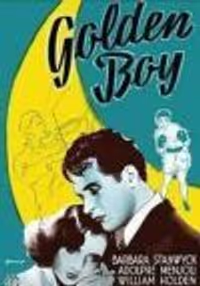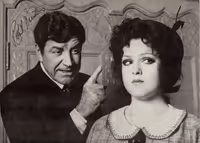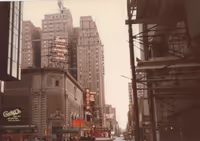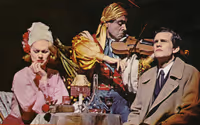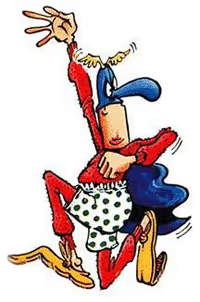WSJ: What’s Wrong With The Broadway Musical?
#50What's wrong with Broadway?
Posted: 5/13/18 at 12:33pm
PatrickDC said: "Have we just run out of creative ideas, period? There are only so many notes in music and ways to configure them. Plays and musicals all have a standard arc — people come together, discover a problem or need for a quest, encounter challenges tackling the problem or quest, and all is eventually resolved. For human characters, how many ways can you write boy-meets-girl in a completely 100% original way?"
The utterly cool and astonishing thing is that the answer is no. The thrill is in the discovery of how wrong those ideas (that I am pretty sure you are offering rhetorically) are.
#51What's wrong with Broadway?
Posted: 5/13/18 at 12:49pm
MrsSallyAdams said: "I'd be interested to learn how folks on this board feel about contemporary opera. It seems to hold a place in the discussions here of legit singing, revival vs. new work, and fading audiences.
I'd avoided opera in the past due to the emphasis on sound over story telling. I want to be told a good story and to connect to a protagonist. If the opera is in English I want to understand the text without reading the super titles. On the rare occasion this occurs I see the power and scope that differentiates opera from musical theater. When it does not occur I concede that I am not opera's target audience."
I find contemporary opera to be tremendously exciting, almost moreso than contemporary musical theatre - since contemporary opera is pretty specifically not beholden to groups of shareholders, it's actually a fairly wild field with a lot of experimentation, particularly in Europe where there's more public arts funding. Breaking The Waves and The Exterminating Angel were both beautiful, astonishing, intelligent productions. Also, it's more of a musical but the Robert Wilson/Rufus Wainwright/Berliner Ensemble production of Shakespeare's sonnets, which played briefly at BAM, is one of the best and most overlooked theatrical works of the new millennium, it's like a musical adaptation of a Roy Andersson film.
#52What's wrong with Broadway?
Posted: 5/13/18 at 12:53pm
HogansHero said: "There is nothing inherently wrong with any category. That's demonstrable.
People don't like shows they don't like. That's a fact, and it is not gonna change. And there will always be shows folks don't like and therefore don't go to see. And we need bad shows as much as we need good ones because if we don't make bad theatre we are not taking the risks we need to take. It's hard to remember but Hamilton was a risk, a big risk.
The problem is that there are not enough good people working in musical theatre. There are historical reasons for this and it is changing some, but it needs to change more. Flushing the nostalgia from musical theatre is job #1. That's forward looking. Teachout of course doesn't work that way."
I have a co-worker dying to see “Charlie and the Chocolate Factory” when the National Tour comes through Pittsburgh. She’s also the one that thought “Hello, Dolly! was about Dolly Parton. But this same person has zero interest in seeing any of the other shows in the 2018/2019 season which include “Dear Evan Hanson”, “Anastasia”, “Phantom of the Opera”, “The Play That Goes Wrong”, “The Book of Mormon”, “Come From Away”, and “Fiddler on the Roof”, among others. Another co-worker really, really wants to see “Mean Girls” on Broadway.
When I told them I was going to NYC to see shows like “The Band’s Visit”, “My Fair Lady”, and “Hello, Dolly!” (twice), they were disappointed I wasn’t seeing “Sponge Bob Squarepants” or “Frozen”.
As bad as some people on here thought it was, I really wanted to see “M Butterfly”, but couldn’t make it before it closed. And when “Miss Saigon” comes through in our 2019/2020 season I’ll be there, front row balcony.
I love the classics, with all of the staging and production that throws back to a different time, and new shows that make me think outside the box, or are out of my comfort zone of familiarity. They are “music to my ears”.
It’s also sort of why I’ve avoided Jukebox Musicals and shows like my friends want to see. Some folks prefer only things that are “familiar” and not “strange”. They can sit there for 2-1/2 hours and merrily sing along, be blissfully entertained, and turn off their brains so to speak.
I guess we need all types of musical theater. It’s like you said: There is nothing inherently wrong with any category. People don't like shows they don't like. That's a fact, and it is not gonna change. And there will always be shows folks don't like and therefore don't go to see.”
#53What's wrong with Broadway?
Posted: 5/13/18 at 12:53pm
MrsSallyAdams said: "I'd be interested to learn how folks on this board feel about contemporary opera. It seems to hold a place in the discussions here of legit singing, revival vs. new work, and fading audiences.
I'd avoided opera in the past due to the emphasis on sound over story telling. I want to be told a good story and to connect to a protagonist. If the opera is in English I want to understand the text without reading the super titles. On the rare occasion this occurs I see the power and scope that differentiates opera from musical theater. When it does not occur I concede that I am not opera's target audience."
I love certain opera singers and songs because the vocalists are wonderful, such as Cristina Deutekom.
But I find it hard to sit through a whole opera, because after a few songs it doesn't feel truthful enough to me. Story telling-wise it only works if the singing is completely natural to me. And natural doesn't mean toning down the singing or apologizing for it. Natural means real singing (Lea Salonga, Whitney Houston) going all the way. But opera is the other opposite and it distracts from a true voice, from storytelling, to me. Sometimes it leans a bit too much towards posing. Just like the opposite, apologizing for singing in the les Mis movie distracts in the other way. Both ruin the storytelling of sung thoughts to me, although opera does it much less.
#54What's wrong with Broadway?
Posted: 5/13/18 at 1:08pm
PatrickDC said: "Have we just run out of creative ideas, period? There are only so many notes in music and ways to configure them. Plays and musicals all have a standard arc — people come together, discover a problem or need for a quest, encounter challenges tackling the problem or quest, and all is eventually resolved. For human characters, how many ways can you write boy-meets-girl in a completely 100% original way?"
"People come together, discover a problem/quest, encounter challenges, and arrive at a resolution" is almost literally every story that isn't deconstructed or postmodern or what have you. But there are plenty of different ways to tell a story, and it doesn't have to be boy meets girl. One of my favorite shows is Nixon in China, which is technically an opera but is so blissfully musical that I'll talk about it anyways. Much of the show is strictly an examination of political meetings, but it uses that as a launching point for discourse on interior lives, the desire for happiness and peace, and what it means to be American or Chinese.
Pat Nixon's aria "This Is Prophetic" is a beautiful, moving piece that is both a diverting, floating, poetic moment and a comment on Pat Nixon's character - she envisages a future that is blissful and happy, and it's framed almost entirely in sturdy Americanisms. "Let lonely drivers on the road pull over for a bite to eat", or "Let the expression on the face of the statue of Liberty change just a little; let her see what lies inland". It's one of my favorite uses of time in a show - for eight minutes everything stops so we can consider this viewpoint, and it colors the entire opera.
It's a great example of how a musical doesn't have to be dumb or obvious - per the famous quip, can the adults please smoke?
#55What's wrong with Broadway?
Posted: 5/13/18 at 1:21pm
Dave28282 said: "MrsSallyAdams said: "I'd be interested to learn how folks on this board feel about contemporary opera. It seems to hold a place in the discussions here of legit singing, revival vs. new work, and fading audiences.
I'd avoided opera in the past due to the emphasis on sound over story telling. I want to be told a good story and to connect to a protagonist. If the opera is in English I want to understand the text without reading the super titles. On the rare occasion this occurs I see the power and scope that differentiates opera from musical theater. When it does not occur I concede that I am not opera's target audience."
I love certain opera singers and songs because the vocalists are wonderful, such as Cristina Deutekom.
But I find it hard to sit through a whole opera, because after a few songs it doesn't feel truthful enough to me. Story telling-wise it only works if the singing is completely natural to me. And natural doesn't mean toning down the singing or apologizing for it. Natural means real singing (Lea Salonga, Whitney Houston)going all the way. Butopera is the other opposite and it distracts from a true voice, from storytelling, to me. Sometimes it leans a bit too much towards posing.Just like the opposite,apologizing for singingin the les Mismovie distracts in the other way. Both ruin the storytelling of sung thoughts to me, although opera does it much less."
While you're certainly entitled to your opinion, I think viewing opera through this lens robs you of the ability to see it for what it is, or is trying to be. Certainly, the singing technique of opera developed around a somewhat unnatural set of demands: being able to project one's voice without amplification into the rafters of an opera house, and thus is not going to sound "naturalistic" in the way you prefer your singing to be. It's not possible to fill an opera house singing like Lea Salonga or Whitney Houston or Frank Sinatra. But there's a thrilling, primal beauty in the operatic voice that transcends naturalism. While Leoncavallo, Mascagni, Puccini et al. called their operatic approach "verismo" (realism), the reality of opera is a sort of augmented reality. Emotion is portrayed in a stylized, almost archetypal way, rather than what you're used to in modern musical theatre or commercial music. It's not meant to tell the story in a fully straightforward, naturalistic way, and yet when you hear a good opera singer (find Corelli singing "Nessum Dorma" or Pavarotti singing "Una furtiva lagrima"), it gives you an experience that is different, almost ethereal and transcendent, from what you would get from a more naturalistic performance convention. It's like the difference between ballet and contemporary dance: the latter is less beholden to conventions, but the former can be moving in its own way.
In Asia, there are many theatrical traditions like Bonraku, Chinese opera, Balinese theatre, Kathakali in India, etc. Each of these are highly stylized forms of storytelling. I remember seeing a touring production of The Ramayana performed by a Balinese theatre group that incorporated puppets, dance, and chanting. It was beautiful. It told the story, but in unique and very specific ways. It wasn't what one would call "naturalistic." If you're viewing these art forms through a narrow lens of late 20th-century musical theatre or pop music, you miss out on the ability to appreciate them for what they are.
#56What's wrong with Broadway?
Posted: 5/13/18 at 5:19pm
To be perfectly clear, I did not condemn jukebox musicals. I said that Jukebox musicals can be great entertainment.
I enjoy them myself.
But they do not contribute any new music to our culture. That's all.
Risky musicals like Light in the Piazza and Bridges of Madison County contributed grand and serious new scores, which may or may not "stick" over time. I give them credit for putting the music of relatively young and little known composers out there for everyone to hear.
#57What's wrong with Broadway?
Posted: 5/13/18 at 5:44pm
The reason we have a wealth of commodity musical is shear economics as well as the loss of the solo producer with a vision.
Gone are the days of the Hal Princes, The David Merricks, Feuer and Martin, The Saint-Subbers. -- the single headed producer (sometimes a team) who got the material, added a composer and lyricist combined them with a book writer and a director went out of town and honed the musical. That formula lead to the brilliance of Fiddler, Hello Dolly, Mame, Guys and Dolls, and insert any golden age musical here. We now have producing by committee.
We have producing by committee because it takes a minimum of 5 million dollars (of three times that) to put on a musical. So to attract investors for this mega dollar musical you need to attract someone with the names Legally Blond, Mean Girls, Frozen etc.
And because we do this we get Legally Bland, Bland Girls and Frozen TV Dinner.
Its the loss of the single minded producer, the cost of musicals, and attracting investors to make the multi million cap.
And as to the person who thought Half A Sixpence (which was a delight) , Golden Boy (which I would have killed to have seen) and Fiddler was a bad seasons... I'd take that season over this season any day.
And why do we put down well produced original musicals like Bandstand and War Paint? They were so much better than any musical nominated last year. But War Paint and Bandstand did not have movie recognition so they suffered at the box office.
It's all about money.. not art. Money.
Impossible2
Broadway Legend Joined: 3/31/18
#58What's wrong with Broadway?
Posted: 5/13/18 at 8:27pm
goldenboy said: "The reason we have a wealth of commodity musical is shear economics as well as the loss of the solo producer with a vision.
Gone are the days of the Hal Princes, The David Merricks, Feuer and Martin, The Saint-Subbers. -- the single headed producer (sometimes a team) who got the material, added a composer and lyricist combined them with a book writer and a director went out of town and honed the musical.That formula lead to the brilliance of Fiddler, Hello Dolly, Mame, Guys and Dolls, and insertany golden age musical here. We now have producing by committee.
We have producing by committee because it takes a minimum of 5 million dollars (of three times that) to put on a musical. So to attract investors for this mega dollar musical you need to attract someone with the names Legally Blond, Mean Girls, Frozen etc.
And because we do this we get Legally Bland, Bland Girls and Frozen TV Dinner.
Its the loss of the single minded producer, the cost of musicals, and attracting investors to make the multi million cap.
And as to the person who thought Half A Sixpence (which was a delight) , Golden Boy (which I would have killed to have seen) and Fiddler was a bad seasons... I'd take that season over this season any day.
And why do we put down well produced original musicals like Bandstand and War Paint? They were so much better than any musical nominated last year. But War Paint and Bandstand did not have movie recognition so they suffered at the box office.
It's all about money.. not art. Money."
Because neither of them were particularly good.
Bandstand was great for the first half and died in the second half and War Paint was like watching loud screechy paint dry.
Neither of them are as good as The Band's Visit, Mean Girls or Spongebob.
#59What's wrong with Broadway?
Posted: 5/13/18 at 10:39pm
I was interested in reading Tony predictions for Next to Normal on this board (to see what everyone thought before the final results), so I went to look back at the 2009 Tony predictions. It was a season of Billy Elliot, Shrek, 13, Rock of Ages, etc. Everyone was saying how depressing it was and how Broadway was a tourist trap now and how pathetic Broadway has become. This was before Lin-Manuel had even begun writing Hamilton. There are weak seasons. There are seasons that have a lot of commercial properties and are therefore "lesser" in people's minds. But there are writers hard at work, making the next great pieces of art that will change the game and go down in history. Stop worrying about the state of musical theatre just because SpongeBob the musical is successful. Don't disregard the work and sleepless nights and tiring audition processes just because you have an arrogant view of what musical theatre should be. It's a slow season for new musicals, but just last year and the year before, we had some of the most exciting new musicals ever. That will happen again shortly. It happened in 2009 and now it's happening again. There's so much brilliant musical theatre to be seen today and so much to look forward to.
#60What's wrong with Broadway?
Posted: 5/13/18 at 10:47pm
Kad said: "When it's 2018 and you are still defining something by the standards of 1968, I think the problem is you and not the medium."
Particularly when you write as if nobody else ever noticed the divergence between Broadway and popular culture in the 1960s. (I was lecturing on the subject to college freshmen and women 25 years ago and even then I wasn't pretending I invented the idea.)
I also find his distinction between large and small Broadway musicals almost entirely arbitrary. Okay, thank to economics we'll almost certainly never see a 105-cast-member DESERT SONG again, but if what you really want to see is 100 showgirls doing a time step in unison, go rent a Busby Berkeley movie. My two favorite shows are FOLLIES and FALSETTOS--and they are favorites for many of the same reasons despite the extreme difference of size.
green waver
Stand-by Joined: 11/3/16
#61What's wrong with Broadway?
Posted: 5/13/18 at 10:50pm
Thank you, E101-you articulated what I only hinted at. One season is an awfully small sample size, and no reason to eulogize the death of the original, ground breaking musical.
#62What's wrong with Broadway?
Posted: 5/13/18 at 11:17pm
I will say, for whatever reason, Broadway is always a bit of a step behind pop culture and has kind of become a joke to itself. I don't remember the last time I've seen a comedy musical and there wasn't a laughing-at-itself tap number. I think, honestly, American Psycho was ahead of its time. Say what you will, but the music is on the pulse of the Top 40 radio right now. Very synth/DJ heavy stuff.
The shows are just too large and too expensive to sustain theirselves. That's why the smaller musicals are itching along. There's absolutely nothing flashy happening in Hamilton, DEH, Come From Away. But the stories are interesting.
bear88
Broadway Legend Joined: 4/26/16
#63What's wrong with Broadway?
Posted: 5/14/18 at 4:34am
It seems a bit silly to complain about Broadway musicals after two seasons that have included a crossover, money-minting, critically-acclaimed smash (Hamilton), another huge hit that has easily survived and thrived without its leading man (Dear Evan Hansen), another buzzy musical with no stars that continues to do good box office business despite no big award (Come From Away), an honorable flop that certainly qualified as being big and ambitious and retains a loyal following even in death (Great Comet), and a female-dominated musical that has thrived even though it opened in the year of Hamilton (Waitress). Only the latter show could boast of much star power when it started, and all were original stories with new songs.
Even Teachout likes The Band's Visit, but he gets hung up on the fact that it opened off-Broadway, as if that matters. The only problem with his logic is the Broadway focus, and his need for the shows to be big - whatever that means. He sounds like Norma Desmond in Sunset Boulevard. Was Great Comet not ambitious enough for him? Does the size of Hamilton's cast or its unobtrusive set really diminish the musical? The last great musical was in 1964? Really? Teachout's job must be miserable.
Let's stipulate, for the sake of argument, that this Broadway new musical season was awful. (I haven't seen any of the shows, so I can't say.) What has anyone learned? Well, the "brand extension" shows didn't really do all that well, unless it's Mean Girls, which is known by heart by a generation of young women (my daughters included). Frozen is underperforming. SpongeBob might be wonderful, might get some Tony awards, might pick up a little this summer. But for the producers, it's a big flop. Unless a Tony win inspires a lot of people to rush out to see The Band's Visit after all this time, the only word-of-mouth hit may turn out to be Summer, which was hated by most critics but promises a fun, nostalgic and well-performed night out for its target audience.
That might inspire more jukebox musicals, which are popping up everywhere. I've seen two such Broadway-bound shows in the San Francisco Bay Area in recent months (Ain't Too Proud and Head Over Heels). But it seems premature to conclude that Broadway producers have given up on original work. How much are the producers of Hamilton and Dear Evan Hansen making?
One other thing, and it's been mentioned a bit already: Broadway loves revivals, loves its classics, loves casting new stars in old roles and taking an old show out for another spin. They also usually tour well. And that's not even counting the old shows that are revived all the time in regional theater productions. The "golden age" gets plenty of respect, and fans of those old musicals have ample opportunity to see them. I don't really understand why Teachout and other folks are so bitter that it isn't still 1964.
#64What's wrong with Broadway?
Posted: 5/14/18 at 5:02am
I used to visit NY from the UK every year, Cram in 10 or 12 shows. No more I'm afraid, the over priced & over hyped 'Hamilton' was the straw that broke this camels back . I know I'm an old fart. But Broadway now seems aimed, only at 14 year old girls
Sadly, the West End is starting to go the same way.
Plus rip off ticket prices for some very average fayre. Very depressing.
#65What's wrong with Broadway?
Posted: 5/14/18 at 6:23am
So easy to look back at the mid 60s and see HELLO DOLLY, FIDDLER etc and say oh we should be doing that. Completely uneducated on the masses of crap that came and went alongside them for many of those years. Just like today.
Not to mention that many of the hits back then were (gasp) direct film adaptations or adaptations of plays as filtered through a popular film. Some were successful, others flopped hard. The same is true today.
And people always go on about the big musicals of yesteryear. Meanwhile many of those sets were drops and flats etc that people would decry today.
After Eight
Broadway Legend Joined: 6/5/09
#66What's wrong with Broadway?
Posted: 5/14/18 at 6:58am
"So easy to look back at the mid 60s and see HELLO DOLLY, FIDDLER etc and say oh we should be doing that. Completely uneducated on the masses of crap that came and went alongside them for many of those years. Just like today."
Except that those so-called "masses of crap" were infinitely superior to the overhyped trials by dire that win accolades and awards today.
And it's not those who look back favorably on what they experienced who are the "uneducated" ones. It's those who look back scornfully --- and as authorities on the subject, no less --- on what they didn't experience.
After Eight
Broadway Legend Joined: 6/5/09
#67What's wrong with Broadway?
Posted: 5/14/18 at 7:08am
Bear88 wrote: "I don't really understand why Teachout and other folks are so bitter that it isn't still 1964."
In a nutshell, the musicals of 1964 were better.
Why are people so bitter that that happens to be the case?
#68What's wrong with Broadway?
Posted: 5/14/18 at 7:13am
Well said AE
Updated On: 5/14/18 at 07:13 AM#69What's wrong with Broadway?
Posted: 5/14/18 at 7:45am
I agree with much of what Goldenboy wrote. Money makes the world go round. When four of five musicals fail to recoup, asking someone to back a new musical is asking for a donation, not an investment. Clearly this is going to have a large effect on what shows reach Broadway.
When, to my surprise, I was asked, or rather given the opportunity, to invest in Smoky Joe’s (originally intended for Broadway but scaled back to off-Broadway with hope of a transfer), I did my homework and it was not pretty. A producer who produces a string of expensive flops will soon be producing regional theater in Idaho, so of course there is pressure to keep it safe and small.
Roundabout is the poster child for a theater company always in need. I have never been quite able to understand why they are unable to monetize their most valuable assets: recordings of their most popular productions. Cabaret is a musical already well known to the public since, of course, it was made into a hit film with a hit song. Would there not be great interest in Cabaret starring Emma Stone, the highest paid actress in the world (so they say). There was certainly interest at the time, as Roundabout extended twice and doubled the number of premium seats.
I know people will raise arguments concerning unions and contracts and intellectual property rights. But if the money is there just get it done and divide the spoils.
#70What's wrong with Broadway?
Posted: 5/14/18 at 10:55am
One season is an awfully small sample size, and no reason to eulogize the death of the original, ground breaking musical.
Especially when this season seemed like an abundance of new shows over such seasons as 88-89 and 94-95. Broadway musicals survived past those seasons and will carry on as usual.
I think, honestly, American Psycho was ahead of its time. Say what you will, but the music is on the pulse of the Top 40 radio right now. Very synth/DJ heavy stuff.
Although the score was a deliberate homage to 80s synth-pop.
No more I'm afraid, the over priced & over hyped 'Hamilton' was the straw that broke this camels back . I know I'm an old fart. But Broadway now seems aimed, only at 14 year old girls
My mother is 73 and Hamilton is one of her favorite shows. She also loves Falsettos, Hedwig and the Angry Inch, Sweeney Todd, Violet, Fun Home, Book of Mormon, Cabaret, A New Brain, Chicago, Caroline or Change, Forever Plaid, She Loves Me, Hair, Lion King, Matilda, Gentleman's Guide to Love and Murder, Rock of Ages, Xanadu, American Idiot, Tommy, Rent, Next to Normal, Les Miserables and Fiddler on the Roof. If Broadway now seems to be aiming at 14 year-old girls, it's lucky that is has been successful beyond its target demographic.
#71What's wrong with Broadway?
Posted: 5/14/18 at 10:57am
It is an open secret that Roundabout is terribly managed.
#72What's wrong with Broadway?
Posted: 5/14/18 at 3:25pm
Just for giggles, the musicals of 1964 (shows that recouped in bold):
Hello, Dolly! (2,844 performances)
Josephine Baker (40 performances over two separate engagements)
Rugantino (28 performances)
Foxy (72 performances)
What Makes Sammy Run? (540 performance)
Funny Girl (1,348 performances)
Anyone Can Whistle (9 performances)
High Spirits (375 performances)
Cafe Crown (3 performances)
Fade Out-Fade In (271 performances)
Folies Bergere (191 performances)
The Committee (61 performances)
Fiddler on the Roof (3,242 performances)
Oh What a Lovely War (125 performances)
Cambridge Circus (23 performances)
Golden Boy (568 performances)
Ben Franklin in Paris (215 performances)
Something More! (15 performances)
Zizi (49 performances)
Bajour (232 performances)
I Had a Ball (199 performances)
21 musicals in a single year is indeed impressive. 14% of them were hits.
The musicals of 2017 (shows still running, but not yet recouped in italics):
Paramour (366 performances)
Holiday Inn (117 performances)
Natasha, Pierre and the Great Comet of 1812 (336 performances)
A Bronx Tale (596+ performances)
Dear Evan Hansen (593+ performances)
In Transit (145 performances)
Come From Away (481+ performances)
Amelie (56 performances)
War Paint (236 performances)
Groundhog Day (176 performances)
Charlie and the Chocolate Factory (305 performances)
Anastasia (432+ performances)
Bandstand (166 performances)
Prince of Broadway (76 performances)
The Band's Visit (204+ performances)
Spongebob Squarepants (175+ performances)
17 new musicals isn't that much less than in 1964, but the success rate, still to be determined, is likely to fall in the 18-29% range.
As long as we're taking rides in the wayback machine to whine about the state of Broadway musicals, we should be fair and equidistant from 1964, so let's look at the Broadway "musicals" of 1911:
Marriage a la Carte (64 performances)
The Slim Princess (104 performances)
The Paradise of Mahomet (23 performances)
The Hen-Pecks (187 performances)
The Balkan Princess (108 performances)
Jumping Jupiter (24 performances)
The Pink Lady (312 performances)
La Belle Paree/Bow-Sing/Tortajada (96 performances; returned for additional 8 performances)
Little Miss Fix-It (64 performances)
The Lamb of Delft (11 performances)
Dr. De Luxe (32 performances)
A Certain Party (24 performances)
Il Saltimbanchi (3 performances)
Hell/Temptations/Gaby (92 performances)
Amour di Principe (7 performances)
Hi Hornor: The Barber (16 performances)
The Red Rose (84 performances)
Ziegfeld Follies of 1911 (80 performances)
The Girl of My Dreams (40 performances)
Hello, Paris (38 performances)
The Siren (116 performances)
Around the World (445 performances)
Miss Jack (16 performances)
The Fascinating Widow (65 performances)
When Sweet Sixteen (12 performances)
The Kiss Waltz (88 performances)
A La Broadway (8 performances)
The Little Millionaire (192 performances)
The Revue of Revues (55 performances)
The Never Homes (92 performances)
The Duchess (24 performances)
Gypsy Love (31 performances)
The Enchantress (112 performances)
The Quaker Girl (248 performances)
The Wife Hunters (36 performances)
The Red Widow (128 performances)
The Three Romeos (56 performances)
Vera Violetta/Undine (112 performances)
Little Boy Blue (184 performances)
Peggy (36 performances)
Betsy (32 performances)
The Wedding Trip (48 performances)
Huh. Twice as many musicals in one year than in 1964. Now, I don't know which shows recouped their investments, but certainly the complainers of today would have said exactly the same thing in 1964 about the musicals produced on Broadway in 1911, right? Because in 1964, they would judge all musicals on the standard of the musicals produced 53 years earlier and not expect anything to have changed. Right? Because that makes SO MUCH SENSE!
#73What's wrong with Broadway?
Posted: 5/14/18 at 3:27pm
Mister Matt- I don't think your bolding on the 1964 list worked, unless Hello, Dolly, Funny Girl, and Fiddler never recouped.
#74What's wrong with Broadway?
Posted: 5/14/18 at 4:13pm
Weird...they appear in bold on my PC. Maybe it looks different in the app or something.
Videos






